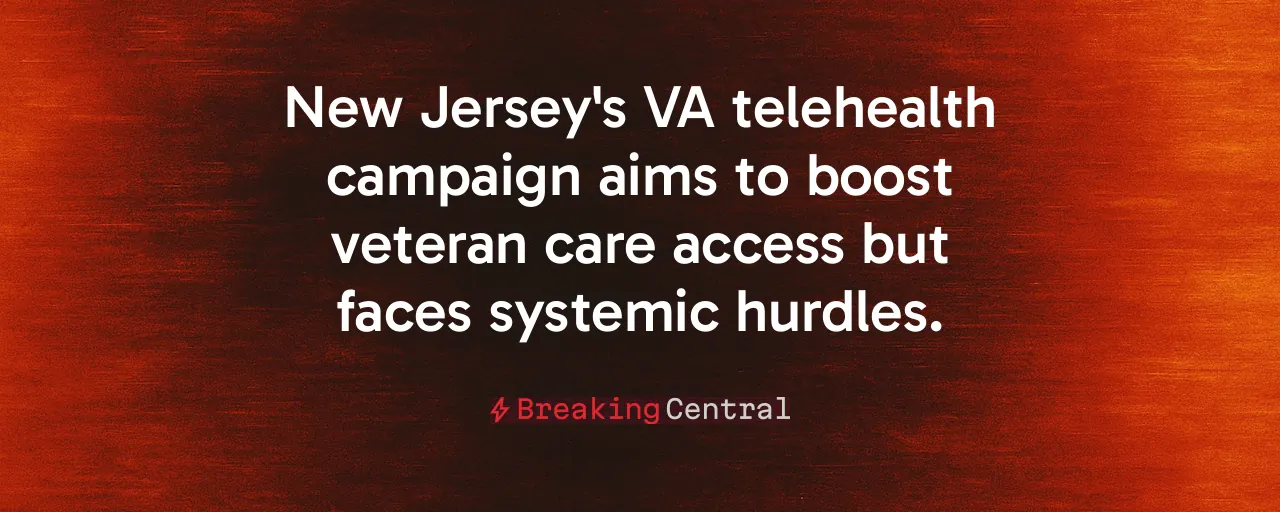A Sign of Support on New Jersey Roads
Travelers along New Jersey's Turnpike, Garden State Parkway, and NJ TRANSIT stations this July noticed something new: flyers promoting Veterans Affairs telehealth services and the Veterans Crisis Line. These posters, placed in 21 service areas and transit hubs, direct veterans to virtual care options and 24/7 mental health support. Backed by Governor Phil Murphy, the campaign aims to ensure veterans, whether local or passing through, know help is close. This visible gesture prompts a deeper question about whether these signs can truly address the real barriers veterans face in accessing timely, quality care.
The initiative, tied to the VA's 'Anywhere-to-Anywhere' Telehealth Practice Authority, allows clinicians to treat veterans across state lines via video. With 7.7 million telehealth visits in 2025 and 93 percent veteran satisfaction, the VA touts its system as a lifeline. Long wait times and bureaucratic hurdles persist for many veterans. The roadside campaign, though well-intentioned, appears a small step given the systemic issues looming large. Veterans require a system that delivers care efficiently and respects their choices, which goes beyond mere awareness.
The VA's Grip on Veteran Care
At the heart of this campaign lies a federal rule from 2018, letting VA providers bypass state licensure laws to deliver telehealth. This pre-emption, confirmed by the Federal Trade Commission, expands access for veterans in remote areas or crossing state lines. New Jersey's transportation agencies jumped on board, plastering posters at rest stops and transit hubs. This reliance on a centralized VA system, however, worries some. Why lean so heavily on a government-run model when private providers could offer faster, more flexible care?
Past VA scandals, from wait-time cover-ups to accountability lapses, fuel skepticism. The 2018 MISSION Act aimed to fix this by expanding private-care options; many veterans still face delays. A 2025 JAMA Network Open study shows VA telehealth improves outcomes like blood pressure control, though it does not address the backlog for in-person visits. Handing out flyers, while acceptable, serves as a Band-Aid on a deeper wound without broader reforms. Veterans deserve a system that prioritizes speed and choice, moving beyond exclusive federal control.
Private Sector as a Solution
One clear path to better care lies in empowering veterans to choose private providers. Vouchers for community clinics could cut wait times and let veterans pick doctors they trust. New Jersey already supports telehealth payment parity, ensuring private providers are reimbursed fairly. Why not expand this model? Private veteran service organizations, often leaner than government agencies, could handle outreach at a lower cost. They've proven effective in connecting veterans to resources without the red tape.
Transportation agencies spending on posters also raises questions. The New Jersey Turnpike Authority's $2 billion budget could stretch further by funding competitive grants for veteran-led nonprofits. These groups, rooted in local communities, know veterans' needs better than distant bureaucrats. Shifting resources from signage to direct support would show taxpayers their money is working smarter. The focus should be on results, not merely optics.
Protecting Veterans' Privacy and Wallets
Another concern is privacy. Veterans accessing telehealth on public Wi-Fi at rest stops risk exposing sensitive health data. The VA complies with HIPAA, but spotty rural bandwidth and unsecured networks could undermine trust. Transportation agencies must ensure posters link to secure, mobile-friendly platforms and that service plazas have the infrastructure for reliable video calls. The campaign's promise falls flat without these fixes.
Then there's the question of cost. Printing and maintaining posters across 21 service areas and transit hubs isn't free. While the expense is small compared to NJTA's budget, every dollar counts. Lawmakers could redirect these funds to practical relief, like toll waivers for disabled veterans. Bills like A5528 and S2755, debated since 2023, propose exactly that. Exempting veterans from tolls puts money back in their pockets, offering tangible support over symbolic gestures.
Learning From the Past
New Jersey's focus on veterans isn't new. A 2017 state grant to Virtua kickstarted telehealth pilots, and by 2018, the VA hit one million virtual visits nationwide. The pandemic cemented telehealth as a norm, with New Jersey leading on policies like interstate licensure reciprocity. These steps show progress, but they also highlight a pattern: government often moves slower than veterans need. Private-sector innovation, rather than federal mandates, drove telehealth's rapid growth. That lesson should guide today's reforms.
Bipartisan support for veterans offers hope. Toll-waiver bills have backing from both parties, and stakeholders agree on expanding crisis-line visibility. The challenge involves balancing short-term outreach with long-term fixes. Regular audits of the roadside campaign's impact, paired with investments in private care and veteran-led outreach, could bridge the gap. Veterans do not need more posters; they need a system that works as hard as they did for their country.
A Smarter Way Forward
New Jersey's roadside campaign is a start; veterans deserve more than awareness. Expanding private-care vouchers, redirecting funds to veteran-led nonprofits, and passing toll-waiver laws would deliver real results. These steps respect veterans' sacrifices while ensuring taxpayer dollars are spent wisely. The VA's telehealth system has strengths, but competition from private providers will push it to improve.
Lawmakers and agencies must also prioritize privacy and infrastructure. Secure telehealth access and reliable broadband at service plazas are non-negotiable. Veterans do not need to choose between convenience and safety. By focusing on choice, accountability, and direct relief, New Jersey can set a standard for veteran care that other states follow.
Ultimately, this extends beyond signs on a highway. It is about honoring a promise to those who served. Veterans need care that's fast, flexible, and focused on their needs. With smart reforms and a commitment to results, New Jersey can lead the way in making that promise a reality.
